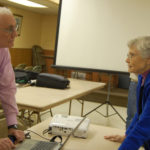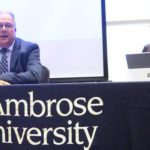By Anne Marie Amacher
The Catholic Messenger
DAVENPORT — Two major announcements related to health were unveiled Oct. 4 at St. Ambrose University. Sister Joan Lescinski, CSJ, the university’s president, said a $1 million gift from an alumnus will be used to create the Institute for Person-Centered Care and to launch a new Master of Public Health degree.

St. Ambrose University President Sister Joan Lescinski, CSJ, donor Thomas Higgins and Sandra Cassady, vice president for strategic initiatives and dean of the St. Ambrose College of Health and Human Services, pose for a picture at a press conference at the Davenport university on Oct. 4.
Thomas Higgins, a 1967 graduate of St. Ambrose and current board of trustee member, donated $1 million because he believes the complementary initiatives will help his alma mater build upon existing strengths in the College of Health and Human Services. It also will position the university as a “thought leader” in a global effort to transform healthcare delivery.
Higgins spoke of a need to focus on the underlying issues when a person living with a chronic illness does not improve. “Is it loneliness? Is it depression?” By having person-centered care, a team of professionals can help identify the issues and find ways to make things better. The hope is that the person’s health will improve with the team’s help.
Applying his knowledge in the fields of health care, legislation, policy making and community health clinic work, Higgins said there are ways to make things better. Although he lives on the West Coast and could have chosen any number of places to house this institute, Higgins said he chose the Quad Cities because of the cooperation he has seen here. The two health systems — Genesis and Unity Point — are competitors yet they work together, he noted. Scott County in Iowa and Rock Island County in Illinois and various social agencies and other organizations work well together and are not separated by the Mississippi River. “They are one and working toward the same goal.” He noted that “St. Ambrose has developed strength with its health services. They will provide an unbiased role in this institute.”
Sr. Lescinski appreciates that Higgins believes St. Ambrose University is “perfectly positioned to advance his goal of improving the quality of health care delivery.” Sandra Cassady, vice president for strategic initiatives and dean of the College of Health and Human Services, noted that in 1987 St. Ambrose College became a university and the College of Health and Human Services began. “It was created, in part, to support the development of many new health and human services programs aimed at helping meet the workforce demands in our region.”
Over the last three decades, the school has developed programs in occupational therapy, physical therapy, nursing, social work, speech-language pathology, physician assistant studies and exercise physiology.
The concept of person-centered care closely aligns with “each of our established programs as faculty and curricula emphasize the importance of caring for the whole person. And we provide many experiences from classroom to practice that prepare our graduates to work as members of inter-professional teams,” Cassady said.
The Master of Public Health will expand the university’s portfolio of offerings and prepare graduates who will work with individuals and communities by identifying health threats and securing resources to address identified needs. “Public health professionals also play an important role in advocating for and developing policy to address health inequity and access to health care for all,” she said.
This new program is being developed under the leadership of Melissa Sharer, who joined St. Ambrose in August as the program’s founding director. The program will begin accepting applications in the spring of 2018 and the first cohort of up to 30 students will start in August 2018.
Cassady said person-centered care puts the person at the forefront. “We want to find out what matters to the person. We want to empower them.” If someone is in the hospital, maybe it is possible for care to be done at home with the assistance of any number of agencies. “Technology today makes this possible many times.”
The institute will address three main points, she continued. First it will develop over time; adding the new master’s program fits in well. Second, the institute will offer continuing education for many different professionals. Third, the institute will bring together various organizations to work on setting up models. “We will study different models and try them out. We will grow with the community’s needs.”
Higgins said St. Ambrose is a great place to launch this initiative. “There is a readiness to take this to the next level.”











